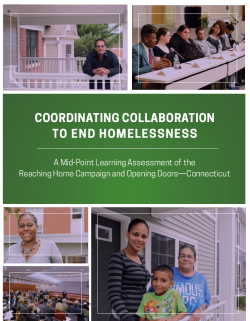Coordinating Collaboration to End Homelessness
In Connecticut, the Partnership for Strong Communities and a group of advocacy organizations, government agencies, and community providers led a 2015 campaign to end homelessness in the state. Guided by the vision that “No one should experience homelessness,” the Reaching Home Campaign and Opening Doors-Connecticut (the “Campaign”) emphasizes housing as an essential platform for human and community development. The Campaign brings together a broad spectrum of partners representing diverse sectors to collectively build the political and civic will to end homelessness.
As of 2015, the Campaign had already achieved remarkable success. Among its many accomplishments, the Campaign advocated for and secured over $300 million in funding for programs to end homelessness, conducted the state’s first study of youth experiencing homelessness, and is closing in on the goal of ending homelessness among Veterans. To support the Campaign’s work at this important juncture, the Melville Charitable Trust approached The Building Movement Project to conduct a mid-point learning assessment. The goals of the assessment were to help the Campaign take stock of its internal structures and processes, as well as to share insights on what it means to coordinate collaboration given the growing use of “collective impact” as a strategy to address social problems.
In Coordinating Collaboration: A Mid-Point Learning Assessment of the Reaching Home Campaign and Opening Doors-Connecticut, we share learnings from this inquiry. The report focuses on the Campaign’s five main areas of internal development over the past several years: (1) Finding a Shared Purpose; (2) Identifying Key Strategies; (3) Engaging Stakeholders; (4) Structuring and Organizing Collaborative Work; and (5) Developing Processes for Communications and Feedback. It concludes with next steps to support the Campaign’s work moving forward, which may also serve as lessons for other broader collaborative efforts tackling some of the vexing social issues in communities across the country.

